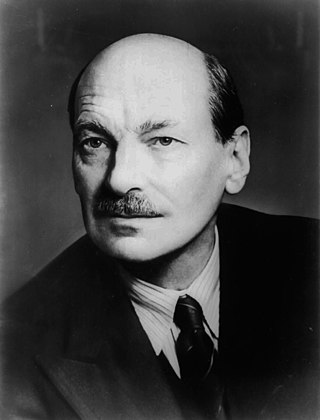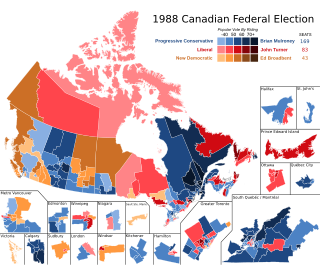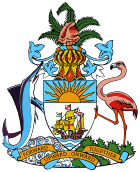
First-past-the-post voting is an electoral system wherein voters cast a vote for a single candidate, and the candidate with the most votes wins the election. Analogous systems for multi-winner contests are known as plurality block voting or "block voting" systems; both FPTP and block voting are "plurality" systems in that the winner needs only a plurality of the votes and not an absolute majority. The term first-past-the-post is a metaphor from horse racing of the plurality-voted candidate winning such a race; the electoral system is formally called single-member plurality voting (SMP) when used in single-member districts, and informally called choose-one voting in contrast to ranked voting or score voting.

The 1945 United Kingdom general election was a national election held on Thursday 5 July 1945, but polling in some constituencies was delayed by some days, and the counting of votes was delayed until 26 July to provide time for overseas votes to be brought to Britain. The governing Conservative Party sought to maintain its position in Parliament but faced challenges from public opinion about the future of the United Kingdom in the post-war period. Prime Minister Winston Churchill proposed to call for a general election in Parliament, which passed with a majority vote less than two months after the conclusion of the Second World War in Europe.

The 1988 Canadian federal election was held on November 21, 1988, to elect members to the House of Commons of Canada of the 34th Parliament of Canada. It was an election largely fought on a single issue: the Canada–United States Free Trade Agreement (CUSFTA); the Progressive Conservative Party campaigned in favour of it whereas the Liberal Party and the New Democratic Party (NDP) campaigned against it.

The 1950 United Kingdom general election was the first ever to be held after a full term of Labour government. The election was held on Thursday 23 February 1950, and was the first held following the abolition of plural voting and university constituencies. The government's 1945 lead over the Conservative Party shrank dramatically, and Labour was returned to power but with an overall majority reduced from 146 to just 5. There was a 2.8% national swing towards the Conservatives, who gained 90 seats. Labour called another general election in 1951, which the Conservative Party won.
The Free National Movement is a political party in The Bahamas formed in the early 1970s, led by Sir Cecil Wallace-Whitfield. The current leader of the party is Michael Pintard and the current deputy leader is Shanendon Cartwright. It dominated the general election held on 10 May 2017, winning 35 of the 39 seats in the Legislature, but was defeated in 2021, losing 28 seats.

The 1951 United Kingdom general election was held twenty months after the 1950 general election, which the Labour Party had won with a slim majority of just five seats. The Labour government called a snap election for Thursday 25 October 1951 in the hope of increasing its parliamentary majority. However, despite winning the popular vote and achieving both the highest-ever total vote until it was surpassed by the Conservative Party in 1992 and again in 2019 and the highest percentage vote share, Labour won fewer seats than the Conservative Party. That was caused mainly by the collapse of the Liberal vote, which enabled the Conservatives to win seats by default. The election marked the return of Winston Churchill as Prime Minister and the beginning of Labour's 13-year spell in opposition. It was the third and final general election to be held during the reign of King George VI, as he died the following year on 6 February and was succeeded by his daughter, Elizabeth II. It was the last election in which the Conservatives did better in Scotland than in England.

The 1926 Canadian federal election was held on September 14, 1926, to elect members of the House of Commons of Canada of the 16th Parliament of Canada. The election was called after an event known as the King–Byng affair.

Elections in the Bahamas take place in the framework of a parliamentary democracy. Since independence, voter turnout has been generally high in national elections, with a low of 87.9% in 1987 and a high of 98.5% in 1997. The current Prime Minister is The Hon. Philip Davis.

General elections were held in the Bahamas on 2 May 2002. The opposition Progressive Liberal Party (PLP) won 29 of the 40 seats in the House of Assembly to defeat the governing Free National Movement (FNM). Voter turnout was 90.2%.

General elections were held in the Bahamas on 19 September 1972. The result was a victory for the Progressive Liberal Party, which won 57.9% of the vote and 29 of the 38 seats.

General elections were held in the Bahamas on 10 January 1967. The result was a tie between the Progressive Liberal Party and the United Bahamian Party, both of which won 18 seats. In a reversal of the previous election, this time the PLP received a lower share of the vote than the UBP, but was able to form the country's first black-led government with the support of the sole Labour Party MP Randol Fawkes.

Early general elections were held in the Bahamas on 10 April 1968. The result was a victory for the Progressive Liberal Party, which won 29 seats. Voter turnout was 85.5%.

General elections were held in the Bahamas on 19 July 1977. The result was a victory for the Progressive Liberal Party, which won 30 of the 38 seats. Voter turnout was 92.6%.

General elections were held in the Bahamas on 10 June 1982. The result was a victory for the Progressive Liberal Party, which won 32 of the 43 seats.

General elections were held in the Bahamas on 19 August 1992. The ruling Progressive Liberal Party won only 44.7% of the popular vote and 16 seats in the House of Assembly. The opposition Free National Movement won 55% of the popular vote and 33 of the 49 seats.
The United Bahamian Party (UBP) was a major political party in the Bahamas in the 1950s and 1960s. Representing the interests of the white oligarchy known as the Bay Street Boys, it was the ruling party between 1958 and 1967. It was led by Roland Theodore Symonette.
The Labour Party was a minor political party in the Bahamas. In the 1962 general elections it won a single seat, taken by Randol Fawkes. Fawkes retained his seat in the 1967 elections, in which the United Bahamian Party and the Progressive Liberal Party won 18 seats each. Although the UBP had won more votes, Fawkes supported the PLP, allowing them to form a government. Fawkes retained his seat again in the 1968 elections, but the party did not contest the 1972 elections.
The Commonwealth Labour Party was a minor political party in the Bahamas.
The Bahamian Democratic Party was a political party in the Bahamas. It contested the 1977 general elections, in which it received 26.9% of the votes and won six seats, becoming the largest opposition party in Parliament. However, it did contest the 1982 elections.

The 2005 United Kingdom general election in England took place on 5 May 2005 for 529 English seats in the British House of Commons. The Labour Party under Tony Blair won an overall majority of seats for the third successive election.








